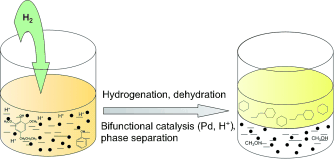May
15
A team of German and Chinese scientists led by Johannes A. Lercher at the Technical University of Munich, Department of Chemistry has developed a new catalytic process for processing the liquid step of the components of bio-oil directly into petroleum type products and methanol. The paper in the journal Angewandte Chemie, the process is described as a “one-pot reaction” catalyzed by a precious metal on a carbon support combined with an inorganic acid.
The research team has developed the new catalytic route with a two-function combination of a stable carbon-supported palladium catalyst with phosphoric acid as the proton source for the reaction. The reaction is a “one-pot reaction,” meaning a combined one-step reaction whose partial reactions (hydrogenation, hydrolysis, and dehydration) occur in the same reactor, with no intermediate work-up steps that add complexity and costs.
The end result is a mixture of various alkanes (petroleum type products) that separates into a second phase, making it easy to separate them from the liquid bio-oil phase. Zhao says in the paper, “The new route provides a feasible approach for the direct use of crude aqueous bio-oil mixture, facilitating an energy-efficient and atom-economic process.”
The bio-oil or pyrolysis oil is first produced by fast pyrolysis or mechanical liquefaction of biomass. At that point the oil is a promising second-generation renewable energy carrier, but its high oxygen content, instability and lower energy content make direct use as an advanced liquid fuel unfeasible. There are a large number of research efforts underway exploring pathways for the efficient upgrading of bio-oil to a marketable and universally interchangeable hydrocarbon fuel. The US Department of Energy is also actively funding research in stabilizing bio-oils to support such upgrading.
Natural bio-oil is liquid, acidic, and highly oxidized mixture containing 15–30% by weight of H2O with a pH near 2.5. Bio-oil is a highly oxygenated and nearly sulfur-free, approximately 30% by weight a phenolic fraction. Its not useful directly as an advanced fuel, but it is a very attractive feedstock for upgrading into alkanes.
Alkanes, more usually called paraffins, are saturated hydrocarbons; they are among the most important raw materials for chemical industry, and in particular as the starting materials for the production of plastics. They are among the primary fuels in the world’s economy.
The bio-oil target is the oil contains a phenolic fraction consisting of compounds with the main framework being an aromatic ring made of six carbon atoms with some hydroxy (-OH) groups attached. It’s that six-carbon ring with hydrogen atoms molecule that is so desirable. A six-carbon ring can be manipulated into a vast array of petroleum type products.
The products from bio-oil offer a good source of petroleum type products with oxygen rich methanol, a fuel itself as a by-product. With a feedstock from renewable resources, such as specially cultivated plants, wood scraps, and other plant waste becoming the focus of considerable attention this kind of process offers farmers, aggregators of farm products, waste managers and wood products businesses a short path to saleable products in the fuel and chemical industries.
The research team had success in the process demonstration with various model substances. The breath of plant material that could be used should be quite large from trash to cultivated farm products.
Having the whole process in one reactor is a breakthrough. The simplicity of construction and the potential for scaling up look good. The concern though, is the use of the precious metal palladium, but as we’ve seen in other fields, that may be replaced someday with better or cheaper alternatives.
Comments
9 Comments so far



This is incredibly bad news for the Obama administration. After all their efforts to bring about political peak oil in the name of a faux climate catastrophe, the last thing they want is abundant energy that grows on trees!
Nice post! You truly have a wonderful way of writing which I find captivating! I will definitely be bookmarking you and returning to your blog. In fact, your post reminded me about a strange thing that happened to me the other day. I’ll tell you about that later…
Intriguing post. I have been searching for some good resources for solar panels and discovered your blog. Planning to bookmark this one!
Hello, this is my first time i visit here. I found so many interesting in your blog especially on how to determine the topic. keep up the good work.
Interesting read, perhaps the best article iv’e browse today. We learn everyday cheers to you!
I was just having a conversation over this I am glad I came across this it cleared some of the questions I had.
This post makes a lot of sense !
Thanks for posting. Good to see that not everyone is using RSS feeds to build their blogs 😉
Awesome post. I so good to see someone taking the time to share this information